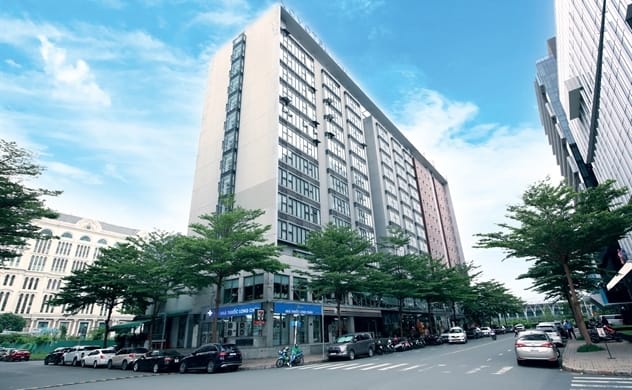
Taking place nearly 10 years ago, the wave of hospitality property acquisitions by foreign hotel operators became stronger than ever after the COVID-19 pandemic. Realizing that the potential of Vietnam’s tourism industry is huge, the world’s leading hotel chains are looking for ways to improve their position in the market, when the global tourism industry is showing signs of recovery.
Acquisition, cooperation, or investment are the ways that foreign hotel chains are increasing at a time when real estate prices are frozen in Vietnam.
EXIT TO SURVIVE
Recently, VietinBank announced the sale of 400 collateral assets, including many 4-5 star hotels, and homestays, worth hundreds of billions of dong. The public also stirred when they heard that the Dolce by Wyndham Hanoi Golden Lake hotel was for sale with a starting price of $250 million.
Hong Kong’s Everland Opportunities IX Limited has successfully acquired 2 ibis Saigon South and Capri by Fraser hotels in District 7, Ho Chi Minh City from Thailand’s Strategic Hospitality Holdings Limited.
The landmark transaction totaled more than $106 million, marking the region’s first hotel portfolio sale of 2023, according to JLL. Many hotels choose M&A or cooperation for liquidity in the challenging market.
 |
Recent survey results done by Colliers Vietnam in 2022 show that the value of hotel transactions has decreased, but the number of transactions has increased at a record level. Obviously, small-scale hotels and resorts are vulnerable to difficult economic conditions and become objects for foreign hotel chains to acquire.
Colliers forecast that the final months of 2023 could see a similar scenario to 2022 and hoteliers will likely continue to sell off properties to survive.
Although there is no specific data, Mr. David Jackson, General Director of Colliers Vietnam, said that the number of search requests from both sellers and buyers in the first 6 months of 2023 increased significantly compared to a year earlier.
“We forecast that the second half of this year will continue to see a high level of interest from domestic and foreign investors. They look for appropriate opportunities in the environment of price increases and unpredictable movements of the economy”, emphasized the leader of Colliers Vietnam.
“In the event that the economic situation of the hotels does not improve, it is very likely that they have to take on debt and the current cash flow cannot pay the debts. That is why we are in the process of consulting and negotiating transactions for a number of hotel properties,” explained Neil MacGregor, Managing Director of Savills Vietnam.
Rising interest rates globally have become a major concern for travelers. They are looking for different sources of capital, including the sale of some assets to maintain operations. “There are plenty of other reasons why they might consider selling off assets. For example, they are paying off loans from the bank, need money to develop other projects, or they have another major business that needs to raise capital,” added Neil MacGregor.
To have liquidity, businesses must conduct M&A deals or mining cooperation. This is something that domestic enterprises are in dire need of at this time, when the cost of capital, including interest rates, sometimes fluctuates at 14-15% for both project development purposes.
Agreeing with the leader of Savills Vietnam, Mr. David Jackson said that since the pandemic occurred, existing investors have been and are looking for ways to expand their presence in Vietnam. With the impressive recovery momentum of Vietnam’s tourism industry and favorable pricing conditions, they are taking advantage of access to high-quality properties in a variety of ways.
For real estate investors, resort real estate has long been considered an attractive and long-term profitable investment. Vietnam has a good foundation for resort real estate development. A booming middle class, increasing access to tourism thanks to improved infrastructure, and the country’s openness to international trade spurs business trips, events, and conferences. “Investing in resort real estate is a smart bet,” said David Jackson.
INCREASING PRESSURE
The slow recovery of the tourism industry in 2022 has “killed” many hotels that have suffered long-term damage. Entering 2023, the situation is also not positive when according to the real estate market report in Ho Chi Minh City in the first 6 months of 2023 conducted by Savills Vietnam, although there is an impressive recovery, the number of international visitors to Vietnam is still slower than other countries in the region.
Indeed, although international flights resumed in March 2022, Vietnam is still among the markets with the lowest number of foreign tourists in Southeast Asia. The number of international visitors to Vietnam in 2022 is 5 times lower than in 2019.
Chinese tourists are already the second-largest market in Vietnam but in the first 6 months of 2023 only 22% compared to the first half of 2019. By June 2023, international flight capacity from China accounted for only 5 % of total flights, down from 13% before the pandemic.
According to the General Statistics Office, the number of international visitors in the first half of 2023 reached 5.6 million, 9.3 times higher than the same period in 2022 and only equal to less than 66% compared to the first 6 months of 2019.
The absence of Chinese tourists, cautious border control policies by Asian countries, health concerns among travelers, costs, and weather are some of the main reasons holding back the recovery. of tourism in Vietnam and Asia in 2022.
As a result, as assessed by Mr. Troy Griffiths, Deputy General Director of Savills Vietnam, the performance of hotels is not very bright. In the first half of 2023, occupancy reached 64%, recovering 92% compared to the first half of 2019. The average room rate reached VND1.9 million/room/night, equal to 97% compared to 2019.
ACCELERATING THE M&A RACE
Not long ago, Mr. Andre Philippe Gerondeau, Managing Director of Meliá Hotels International, made a rare visit to Vietnam to discuss with the leaders of KDI Holdings about opportunities to expand the market here.
“For a corporation with strengths in the field of urban resorts and hotels like Meliá, Vietnam as well as the Asia-Pacific market has the same development potential as other areas such as the coastal area. The Caribbean, both in terms of revenue contribution to the Group as well as the expansion of our international reputation in the years to come,” said Andre Philippe Gerondeau.
The great potential of the Vietnamese market is also the reason why Meliá partnered with KDI Holdings to open Gran Meliá Nha Trang, the first luxury resort of Gran Meliá Hotels & Resorts in Southeast Asia.
In Vietnam, this brand owns a large number of rooms with more than 7,000 rooms and the occupancy rate is always at the top. Currently, the number of hotels that Meliá Hotels International operates in Vietnam is 19, in the coming period another 4-5 hotels will be added, said Andre Philippe Gerondeau.
Vinpearl, Vietnam’s leading resort and entertainment service provider brand, also signed a transfer agreement with Meliá Hotels International to manage 12 hotels and resorts for 10 years and changed its name to Meliá Vinpearl.
Marriott International also cooperates to operate/manage 8 hotels and resorts in Vinpearl. In April this year, Marriott continued to sign another agreement to cooperate in operating 7 more Vinpearl hotels and resorts. This latest agreement with Vinpearl helps Marriott enter two UNESCO-recognized landscapes, namely Hoi An and Bac Ninh.
Marriott operates 16 hotels and resorts across the country. According to the plan, the number of hotels and resorts under the Marriott system will expand exponentially in the next few years. This unit is expected to have at least 30 hotels and resorts in the near future. In the immediate future, by the end of 2023, Marriott will open 4 new hotels.
Explaining the rapid steps to realize expansion ambitions in Vietnam, Mr. Jakob Helgen, Vice President of Marriott International for Thailand, Vietnam, Cambodia, and Myanmar, said that Vietnam is one of the markets. Marriott International’s key strategy in the Asia-Pacific region.
Meliá Hotels International also took similar steps when cooperating with Vinpearl. Operating more than 380 hotels in more than 40 countries, Meliá Hotels International has expanded its market share in Asia in recent years and has become one of the largest international hotel brands in Vietnam.
Growth in the Asia-Pacific region is at the heart of Meliá Hotels International’s development strategy, focusing 100% on resorts and “bleisure” hotels.
The leader of Meliá Hotels International assessed that Asia has the same development potential as other regions in terms of revenue contribution as well as expanding the Group’s international reputation in the coming years.
Talking to the Investigator about the reasons for its strong investment strategy in Vietnam, Mr. Jakob Helgen said that Marriott wants to increase its presence in the places where tourists want to go. “Vietnam is one of those places. Vietnam belongs to the group of the most vibrant and dynamic markets in Asia – Pacific. We believe that Vietnam’s tourism industry will grow strongly because it has a large source of visitors from Korea, China, India, and ASEAN countries,” he said.
The rise of the high-income class is also one of the factors driving Marriott to want to increase its presence in Vietnam. The post-COVID-19 “revenge tourism” movement also contributes to promoting the development of the domestic tourism industry. According to the Vietnam National Administration of Tourism, in 2022, there will be more than 101 million domestic tourists. In the first 5 months of 2023, the whole country recorded more than 50 million domestic visitors and welcomed 4.6 million international visitors, reaching 57% of the 2023 target. The development of niche tourism industries such as care tourism Health, eco-tourism or resort and culinary tourism will increase Vietnam’s attractiveness to international tourists.
Vietnam’s outstanding economic growth is also a key factor for Marriott International to bet on this market. According to the Asian Development Bank (ADB), GDP is expected to grow by 5.8% this year and continue to grow by 6.2% in 2024.
“We are committed to the long-term vision and development of the country. The growth plan remains on track and we continue to take advantage of opportunities to strengthen our portfolio and work closely to support our owners,” said Jakob Helgen.
SINCE 2015
In fact, the wave of acquisitions by foreign hotel operators began in 2015, a year that saw many M&A deals in the global hotel sector, when the world’s leading hotel chains were looking to better respond to economic shocks and strengthen their position in this fiercely competitive market.
Marriott then announced plans to acquire rival Starwood Hotels & Resorts Worldwide, which owns the Sheraton brand. The French hotel giant AccorHotels 2015 also reached an agreement to buy FRHI Holdings Ltd, the owner of three prestigious luxury hotel brands, Fairmont, Raffles, and Swissôtel.
 |
Vietnam is no exception to this trend, even being evaluated as a “rising star” of the Asia-Pacific region in 2016. JLL statistics show that, in the period 2016-2018 In Hanoi and Ho Chi Minh City, there are dozens of hotel M&A deals.
In particular, hotels in Ho Chi Minh City have always been the focus of the property M&A market for many years, with prominent deals such as Novotel Saigon Center, Le Meridien, and Intercontinental Asiana Saigon.
In recent years, despite the impact of the pandemic and challenging global macro conditions, the Vietnamese market has still attracted the attention of foreign investors. The proof is that the total foreign investment capital registered in Vietnam in the first 7 months of this year reached 16.24 billion USD, up 4.5% over the same period last year.
In July 2023 alone, the total registered FDI capital reached more than 2.8 billion USD, an increase of 85.7% compared to July 2022. The real estate business continued to hold the second position with a total registered capital of $1.61 billion, down 49.8% over the same period last year.
Despite a decline in FDI in real estate in the first seven months of 2023, “Vietnam’s real estate market remains attractive to investors,” said Nguyen Viet Hoang, Business Development Director at Colliers Vietnam.
Because, they see the potential in the medium and long term when Vietnam aims to fully recover the tourism industry by 2025, with 18 million international tourists, and by 2030, it aims to welcome 195 million visitors. tourism, including 35 million foreign visitors.
According to the leadership of Marriott International, Vietnam possesses the basic factors to become a leading tourist destination in the world, besides beautiful natural landscapes, long coastlines, rich cultural heritage, and rich cultural heritage. really famous. Vietnam is located in the heart of Asia, just a short flight from many of the world’s largest and most dynamic markets.
Vietnam’s attraction is placed in the context that the global hotel M&A industry has had a fairly active 2022 (hotel M&A revenue reached $46.2 billion in 2022, down just 1% compared to 2021) and is expected to continue to be positive in the following years. According to Reportlinker, the global tourism real estate market value will increase by $75 billion in the period 2022-2027, with a growth rate of 10.25%.
In line with the general recovery trend of the world’s tourism real estate, commenting on the potential of the Vietnamese market in 2024, Neil MacGregor, Managing Director of Savills Vietnam, said that the hotel market in Ho Chi Minh City. Ho Chi Minh City and Hanoi have recovered quite quickly. Occupancy rates have returned to pre-pandemic levels.
Room rates are starting to increase again compared to before the COVID-19 epidemic. And the situation will continue to develop in a favorable direction when more tourists return.
Resorts are a very different story. The resorts have shown good operating capacity thanks to the boom of domestic tourism. According to the Vietnam Hotel Market Report conducted by Technavio, the size of Vietnam’s hotel market is expected to increase by $2.12 billion in the period 2021-2026 and the market will accelerate at a rate of 14.43%.
However, Mr. Neil MacGregor of Savills Vietnam also mentioned the fact that the current international tourist group has not returned as much as expected. According to him, for this tourist segment to recover strongly, support for visa issues and international flights is needed.
“Although international visitors have not returned much, the interest of foreign investors is not low. Vietnam is a country endowed with many beautiful destinations by nature and has a lot of potential for tourism development. That is reflected in the success of domestic tourism growth as well as the speed of recovery in recent years,” said Neil MacGregor.





